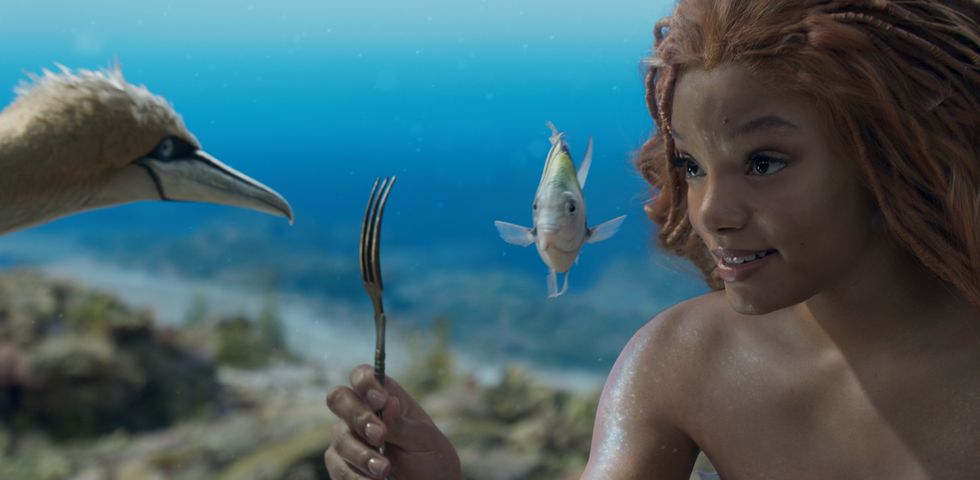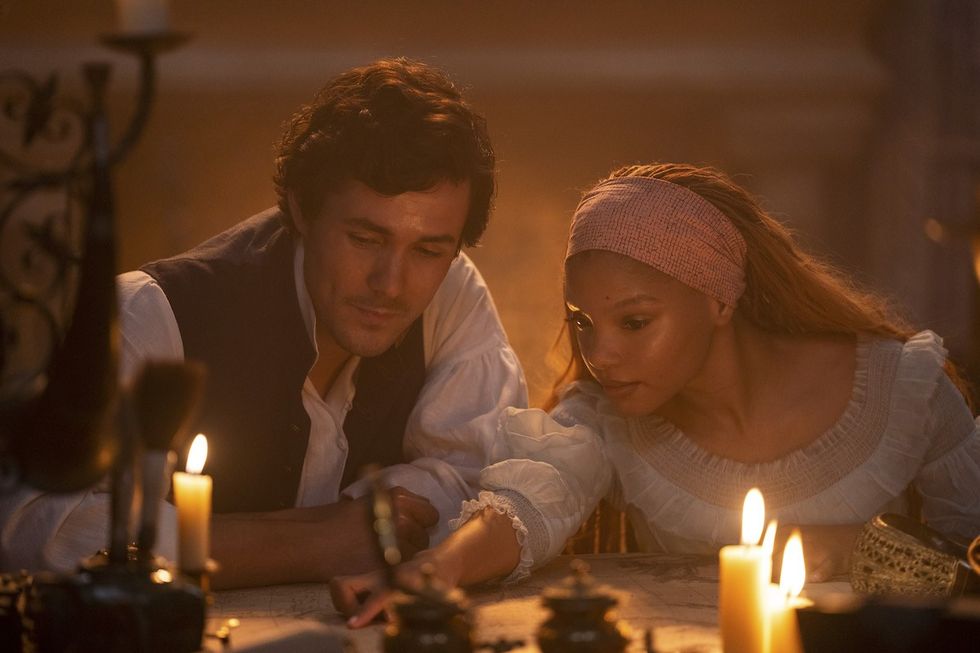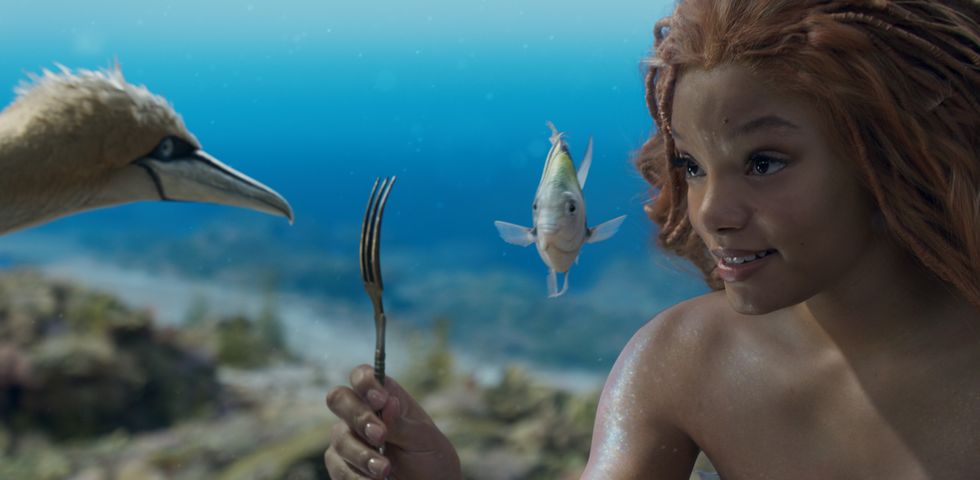
“But a mermaid has no tears, and therefore she suffers so much more” isn’t your average dreamy Disney opener. The Little Mermaid, a dark Hans Christian Anderson fairytale-turned-musical, hits theaters on Friday, May 26. And even if you think you know the story, this adaptation just might surprise you.
‘90s nostalgia knows no bounds in the age of reboots and sequels, but thanks to new thematic elements and storytelling, this live action remake is more than a surface-level romance. It deals with desire, conflict, and consequences in a way that makes the story feel brand new.

The ominous nature of a mermaid having no tears contrasts the iconic “Under The Sea,” in which Sebastian (Daveed Diggs) is trying to convince Ariel (Halle Bailey) that life is much better, well, under the sea than it is on land. While the first act of the movie drags a little, as soon as Melissa McCarthy’s Ursula begins her rendition of “Poor Unfortunate Souls,” the plot takes off like a shot.
To understand the characters and the plot better, director Rob Marshall and producer John DeLuca went back to the original tale. “We were immediately aware of how this was a very contemporary story already in the 1830s about this young girl who feels displaced and wants to…go on a journey of self-discovery…to another world,” Marshall said during the film’s press conference. “The idea that, because a mermaid has no tears, and she feels more, she suffers more, it felt to us like it set the table for this more emotional telling of the story.”
You don’t only see multiple points of tension right from the beginning of the film — you feel them. In addition to Ursula’s iconic villainy as she tries to take King Triton’s power, this remake offers more insight into the human-mermaid conflict than the original cartoon, which feels particularly modern, even if political tensions are a tale as old as time. (Sorry, wrong Disney movie).
One of the film’s greatest strengths is that it is very clear about what every character wants as soon as they’re introduced. Ursula wants to rule the sea, Triton wants to keep his daughters safe, Eric wants his kingdom to catch up with the rest of the world, and Ariel wants to explore life on land.
Eric’s (Jonah Hauer-King) and Ariel’s greatest desires go hand-in-hand; Ariel searches shipwrecks, finding treasures that fell to the bottom of the ocean floor from the world above, while Eric’s desire to bring his kingdom into the future spurs him to explore the world around him. Meaning that even before they meet, both Ariel and Eric almost inherently hold fast to the belief that merpeople and humans shouldn’t fear each other. Even if the film’s culture and time period are vague, the emphasis on unity is something that was enough to bring a smile to my face and tears to my eyes.
Instead of feeling forced, the updates Ariel, Eric, and the rest of the characters get in this rendition enhance their individual arcs and the overall story by filling in gaps I didn’t even recognize when I was eight years old.
When Ursula swaps Ariel’s voice for legs, the titular little mermaid begins her race against time to get true love’s kiss in three days. But one minor addition to the spell changes the rest of the movie: Ursula makes Ariel forget that she needs to kiss the prince, meaning that if they ever do kiss, it’s not because Ariel has to — it’s because she wants to.
This lead up, plus the extra time this version of Eric and Ariel spend together, also means that the almost-kiss Ariel and Eric share during “Kiss The Girl” feels like more of a payoff because the two have formed a friendship first.
“Disney romances are always, you know, they're filled with that instinctive attraction to one another. We all wanna see that,” Hauer-King said during the conference. He approached the characters as two kindred spirits who were both restless in their lives. “I think what was nice about that was that it meant that their relationship feels really earnt. They both felt like they were teaching each other things. They were excited and fascinated by each other's worlds although they didn't actually know it until the end.”
These new themes and the time spent with Eric inviting Ariel to be ~a part of his world~ pair perfectly with the songs we’ve loved since the original cartoon premiered. Iconic ballads like Bailey’s rendition of “Part Of Your World” shine, while the newer “The First Time” allows us into her mind as she processes the world around her — and the real consequences of giving up her voice when Eric doesn’t recognize her. Even if some of the newer tracks like “The Scuttlebutt” feel a little disjointed from the original songs, they’re still a fun inclusion.

But our favorite musical element on a variety of films rings true here as well: Marshall and composer Alan Menken (who’s joined by Lin Manuel Miranda) use the same musical themes throughout the movie in different contexts. By tying different scenes together, they emphasize the story and underscore the emotion without the characters having to say anything.
Ironically, the notion of “saying nothing” is an issue that many people have with the original cartoon. The idea that any woman would literally give up her voice continually strikes a chord with viewers. But there is more to this story.After it’s clear that Eric and Ariel are falling for each other, Ursula (who’s been spying on them) wonders aloud how Eric could possibly fall in love with Ariel if she hasn’t used her siren song. Even if this is supposed to be a throwaway line, it highlights that sometimes there are aspects of ourselves that we put all of our identity and confidence in. But The Little Mermaid is a reminder that we are more than just one career, one personality trait, one physical characteristic.
“I tell people all the time I feel like Ariel truly has helped me find myself and like this young woman version of me,” Bailey says during the conference. “It's been five years of my life now, from 18 to now being 23, so those are [very] transformative years as you're developing as a young woman. But I feel like, especially these themes of the film and what she had to go through with her passions and drive and speaking up for herself, and even though it may be scary, she went for it.”
The racist reactions to her casting have gotten more than enough coverage, but I will never stop talking about all of the little girls who now get to see themselves represented on screen in a way they never have.
“Even just thinking about it makes me emotional,” Bailey says in an interview with British Vogue. “Because I still feel like that inside. I feel like that five-year-old. And it made me so filled with love that they know they’re beautiful and that they can be princesses too.”
Check out The Little Mermaid in theaters this Friday, May 26 — your inner child will thank you.
Lead image via 2023 Disney Enterprises, Inc.
0 Commentaires